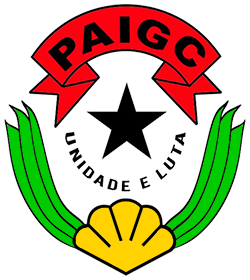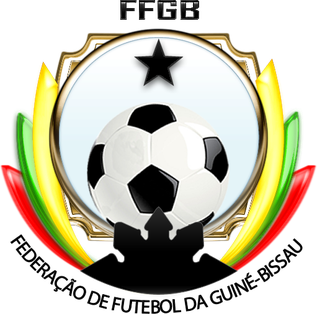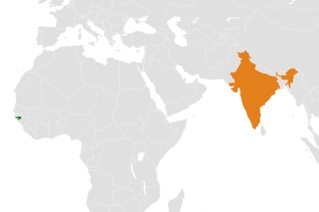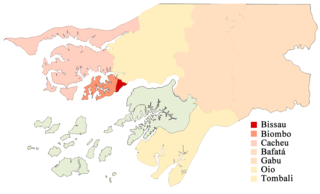Twenty-first century
Years in Africa | |
|---|---|
| Sovereign states |
|
States with limited recognition | |
Dependencies and other territories |
|
This is a timeline of History of Guinea-Bissau . Each article deals with events in Guinea-Bissau in a given year.

Guinea-Bissau, officially the Republic of Guinea-Bissau, is a country in West Africa that covers 36,125 square kilometres (13,948 sq mi) with an estimated population of 2,026,778. It borders Senegal to its north and Guinea to its southeast.

The economy of Guinea-Bissau comprises a mixture of state-owned and private companies. Guinea-Bissau is among the world's least developed nations and one of the 10 poorest countries in the world, and depends mainly on agriculture and fishing. Cashew crops have increased remarkably in recent years, and the country ranked ninth in cashew production for the year 2019.

Bissau is the capital and largest city of Guinea-Bissau. As of 2015, it had a population of 492,004. Bissau is located on the Geba River estuary, off the Atlantic Ocean, and is Guinea-Bissau's largest city, major port, its administrative and military center.

The African Party for the Independence of Guinea and Cape Verde is a political party in Guinea-Bissau. Originally formed to peacefully campaign for independence from Portugal, the party turned to armed conflict in the 1960s and was one of the belligerents in the Guinea-Bissau War of Independence. Towards the end of the war, the party established a socialist one-party state, which remained intact until multi-party democracy was introduced in the early 1990s. Although the party won the first multi-party elections in 1994, it was removed from power in the 1999–2000 elections. However, it returned to office after winning parliamentary elections in 2004 and presidential elections in 2005, since which it has remained the largest party in the National People's Assembly.

João Bernardo "Nino" Vieira was a Bissau-Guinean politician who served as President of Guinea-Bissau from 1980 to 1999, except for a three-day period in May 1984, and from 2005 until his assassination in 2009.

The Guinea-Bissau War of Independence, or the Bissau-Guinean War of Independence, was an armed independence conflict that took place in Portuguese Guinea from 1963 to 1974. It was fought between Portugal and the African Party for the Independence of Guinea and Cape Verde, an armed independence movement backed by Cuba, the Soviet Union, and Yugoslavia. The war is commonly referred to as "Portugal's Vietnam" because it was a protracted guerrilla war which had extremely high costs in men and materiel and which created significant internal political turmoil in Portugal.

The Guinea-Bissau national football team represents Guinea-Bissau in men's international association football and it is controlled by the Football Federation of Guinea-Bissau, The team has never qualified for the FIFA World Cups but qualified for the Africa Cup of Nations four times, making their debut in 2017. The team is a member of both FIFA and Confederation of African Football (CAF).

The unicameral National People's Assembly was Guinea-Bissau's legislative body.

Guinea-Bissau–United States relations are bilateral relations between Guinea-Bissau and the United States.

Guinea-Bissau–Russia relations are the bilateral foreign relations between Guinea-Bissau and Russia.

Republic of Guinea-Bissau passports are issued to citizens of Guinea-Bissau to facilitate international travel. A passport is not required for Guinea-Bissau citizens to travel to member states of the Economic Community of West African States (ECOWAS).

On 12 April 2012, a coup d'état in Guinea-Bissau was staged by elements of the armed forces about two weeks before the second round of a presidential election between Carlos Gomes Júnior and Kumba Ialá. The coup started in the evening with military personnel and equipment making its way onto the streets, followed by the state-owned media being taken off-air.
Bissau-Guinean Americans are Americans of Bissau-Guinean descent. As was the case with almost all current West African coastal countries, the first people in the United States from present-day Guinea-Bissau were imported as slaves. Thus, in the 21st century, there are many African Americans who have discovered, through DNA analysis, they descend mainly or at least partly, from Bissau-Guinean enslaved people.

Visitors to Guinea-Bissau must obtain a visa on arrival unless they come from one of the countries or territories that are visa exempt.

Umaro Mokhtar Sissoco Embaló is a Bissau-Guinean politician serving as the president of Guinea-Bissau since February 2020. He is a political scientist and military officer who previously served as prime minister between November 2016 and January 2018.

Guinea-Bissau–India relations refers to the international relations that exist between Guinea-Bissau and India. The embassy of India in Dakar, Senegal is concurrently accredited to Guinea-Bissau. India opened an Honorary Consulate in Bissau on 28 May 2010. Guinea-Bissau has no diplomatic mission in India.

The COVID-19 pandemic in Guinea-Bissau is part of the worldwide pandemic of coronavirus disease 2019 caused by severe acute respiratory syndrome coronavirus 2. The virus was confirmed to have reached Guinea-Bissau in March 2020.